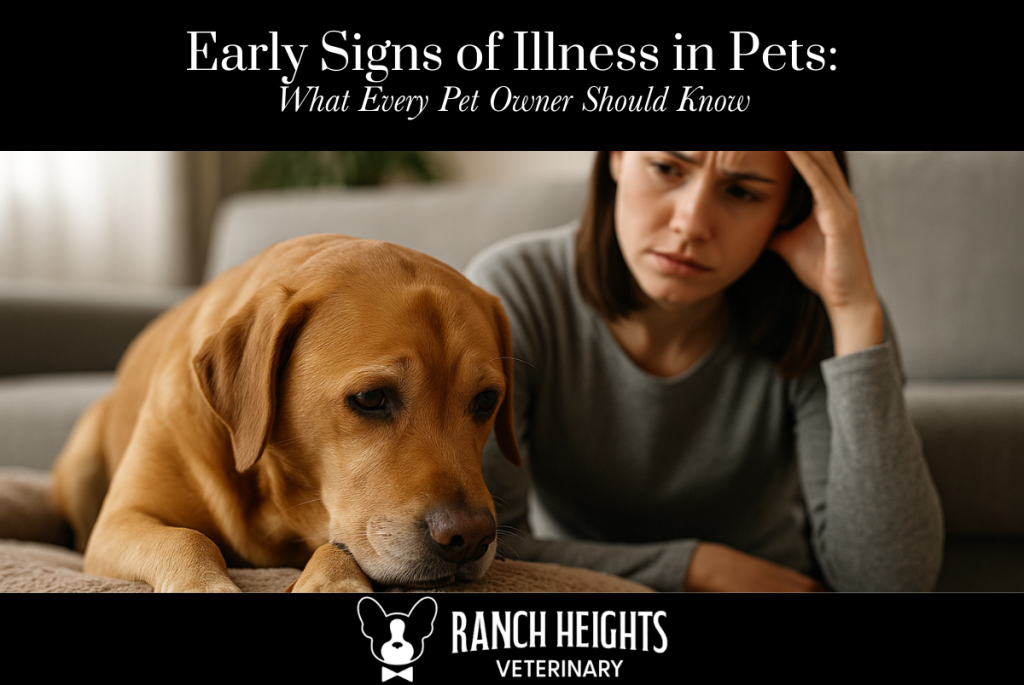
As loving pet owners, we often notice when our furry friends aren’t acting like themselves. But sometimes, the earliest signs of illness can be subtle, making it easy to miss until the condition becomes more serious. At Ranch Heights Veterinary, our goal is to help you recognize the warning signs early so your pet can get the care they need right away.
Why Early Detection Matters
Just like in humans, early detection of health problems in pets often leads to better treatment outcomes. Addressing minor changes quickly can prevent more serious illness, reduce costs, and most importantly—keep your pet healthy and happy.
Common Early Signs of Illness in Pets
Here are some changes to watch out for:
- Changes in appetite or water intake – Eating or drinking much more or less than usual.
- Unexplained weight changes – Sudden weight loss or gain can be a red flag.
- Lethargy or decreased activity – Less interest in playing, walking, or interacting.
- Changes in bathroom habits – Frequent urination, diarrhea, constipation, or accidents in the house.
- Coughing, sneezing, or difficulty breathing – Respiratory symptoms may indicate infection or more serious issues.
- Skin or coat changes – Excessive scratching, hair loss, lumps, or sores.
- Behavioral changes – Irritability, hiding, or sudden aggression.
- Bad breath or dental issues – May indicate dental disease or internal problems.
What to Do if You Notice These Signs
If your pet is showing one or more of these symptoms, don’t wait and hope they resolve on their own. Schedule an exam with a veterinarian as soon as possible. Early treatment can make all the difference.
Q&A: Early Signs of Illness in Pets
Q: My dog is drinking more water than usual. Should I be worried?
A: Yes, increased water intake can signal conditions like diabetes, kidney disease, or hormonal imbalances. It’s best to have your veterinarian run some tests to rule out underlying issues.
Q: How can I tell if my cat’s weight loss is normal or a concern?
A: Cats can lose weight due to age or diet changes, but unexplained or rapid weight loss may point to thyroid disease, diabetes, or cancer. Schedule a veterinary exam if you notice your cat looking thinner.
Q: My pet seems tired all the time. Could it just be age?
A: While older pets may naturally slow down, ongoing lethargy is not normal. It could indicate heart disease, infection, or other systemic illness. A vet exam will help determine the cause.
Q: Should I wait a few days before bringing my pet in?
A: If your pet is showing new or worsening symptoms, it’s best not to wait. Early evaluation helps prevent small problems from becoming emergencies.
Q: How often should my pet get a wellness exam?
A: Most pets should be seen at least once a year for a routine check-up, and senior pets or those with chronic conditions may need visits every 6 months.
Contact Ranch Heights Veterinary
If you’ve noticed changes in your pet’s behavior, appetite, or overall health, we’re here to help.
Ranch Heights Veterinary
📍 2651 Irvine Avenue STE 128, Costa Mesa, CA 92627
📞 Phone: (949) 630-3517
Your pet’s health and happiness are our top priority. Schedule an appointment today and give your furry friend the care they deserve.
